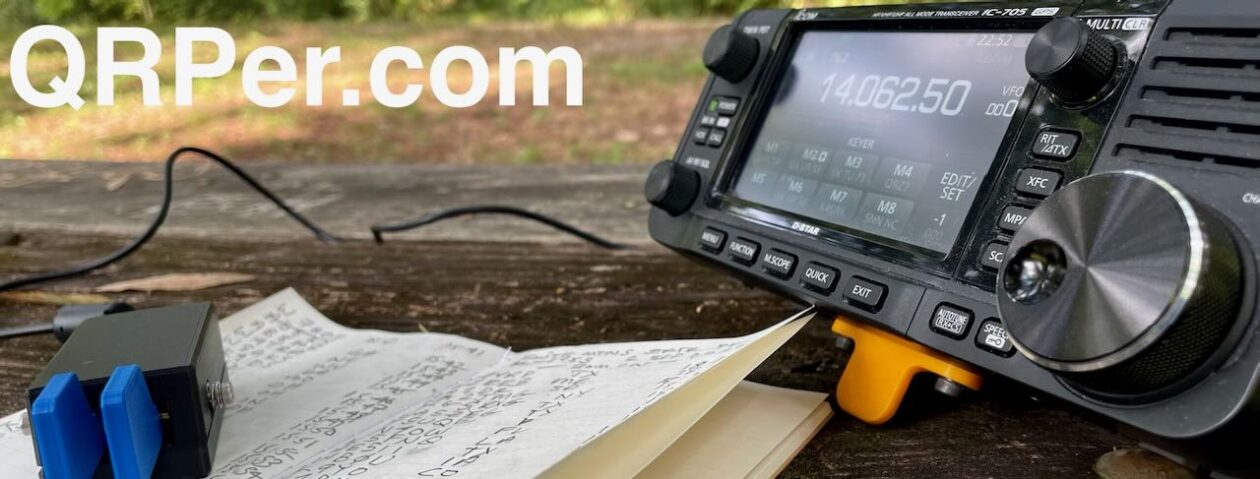Many thanks to Brian (K3ES) who shares the following guest post:

Activating K-0975, Waco Mammoth National Monument
by Brian (K3ES)
At the end of November 2023, my wife and I loaded her minivan, and headed out into the first significant snowfall of the season. I had already been out that morning in my 4WD truck to pull a friend’s car out of a ditch, so I was driving carefully. Our drive took us from our home in northwest Pennsylvania to Baltimore, MD. Happily, weather conditions improved as we went south and east. We were meeting our son, daughter-in-law, and 2-1/2 year old grandson for a family trip to Waco, TX (we flew out of Baltimore-Washington International Airport early the next morning). My wife and daughter-in-law are particular fans of Fixer-Upper and Chip and Joanna Gaines, all based in Waco. Us men-folk were to be educated in the finer points of appreciating this pop-culture phenomenon. Ultimately, we certainly did appreciate the finer points of dining in Waco.
One side-trip that amazed us all was a 10 minute drive up the road to Waco Mammoth National Monument. This relatively new addition to the National Park system is also listed as Parks on the Air (POTA) entity K-0975. Back in the days when the area occupied by the National Monument was private land, two exploring teenagers, who may not have had proper permission, found a bone, a big bone. This bone was delivered to a local museum for identification, and ultimately determined to have been the femur of a female Columbian Mammoth. Legalities being as they are, it took a while longer for the location of the discovery to be made public. An interested and civic-minded land owner made the process less traumatic than might have been, particularly for the wandering teenagers. He also started the process to preserve the site and its archaeological treasures for the public, ultimately leading to its designation as a National Monument. Over subsequent years, archaeological excavation discovered a lot more bones – skeletons from an entire nursery herd of Columbian Mammoths, along with skeletons from other species that visited what was apparently a dangerous waterhole during the last ice age.



Since the discovery, many skeletons have been excavated and removed for study, but many more remain at the site awaiting future recovery. A building has been constructed to cover the excavation and protect the remaining skeletons, and this building is the amazing focal point of the Waco Mammoth National Monument. Ranger-led tours are available, and very much worthwhile.

Setting Up to Activate K-0975
After the tour and a look at the excavation site, I excused myself and set up to activate K-0975. Before the trip, I had sent an email to Phil – WA5PQL, who is the most frequent activator at K-0975. He was gracious and helpful in providing information about the park, the staff, and the locations most suitable for activating. His assistance made a quick, low-stress activation a near certainty. After checking in with the Park Rangers, I had directions and permissions, so all that remained a concern was HF propagation.
While the previous day had been overcast with drizzle, Friday, December 1, 2023, was sunny and warm. It was perfect for walking around the site, and for an outdoor activation. Unfortunately, the same sun that gave us the bright, warm day, had been active producing solar flares that could interfere with radio communications. The only way to know for sure that I could make contacts was to set up my station and call CQ, so that is the path I chose.

Field kit contents from the upper-left (click image above to enlarge):
- 33 gal trash bag for dry seating,
- 15 ft RG316 feedline with BNC male connectors,
- Two pieces of nylon cord,
- Medium-sized pill bottle to be filled with dirt or stones and used as a throw weight,
- 80 ft of Marlow Excel 2mm arborist’s throw line,
- BaMaTech TP-III paddles with connecting cable carried in an Altoids tin,
- Nail clippers as a TSA-approved tool,
- Elecraft KX2 transceiver with SideKX end-panels and polycarbonate cover,
- Tufteln 9:1 end-fed random wire antenna with 35 ft radiator and 17 ft counterpoise,
- Generic ear-bud headphones,
- Homebrew VK3IL-designed pressure paddles with adjacent protective sleeve sitting atop a plastic ziploc bag,
- Rite in the Rain notepad for logging,
- Pentel Twist-Erase 0.9mm mechanical pencil,
- Miscellaneous cable ties.
Not pictured is a Packtenna 10m collapsable fiberglass mast that was available, but not used for this activation.
I brought a very small, but capable, field kit based on my Elecraft KX2 and a Tufteln End-fed Random Wire antenna. A couple of CW keys, a short feedline, and generic earbuds completed the station. I also brought a notepad and a pencil for logging, a plastic garbage bag for seating, and some cordage. The most peculiar part of my kit was a small pill bottle with a hole in its lid. I filled the pill bottle with dirt, passed the end of a 2mm line through the lid and secured it with a knot. I was able to use the dirt-filled bottle as a throw weight to get the line over a tree branch for raising the antenna, then I detached the bottle and returned the dirt. All elements of the kit worked as intended, and TSA asked no questions during my trips through airport security. Continue reading K3ES Activates Waco Mammoth National Monument











































